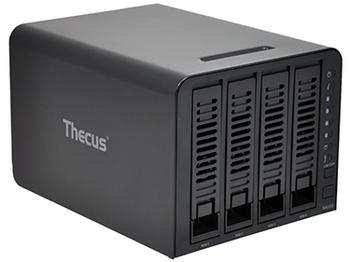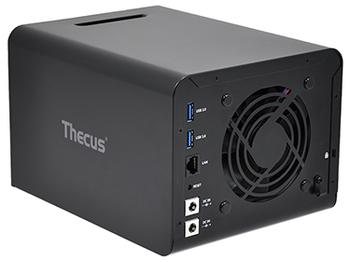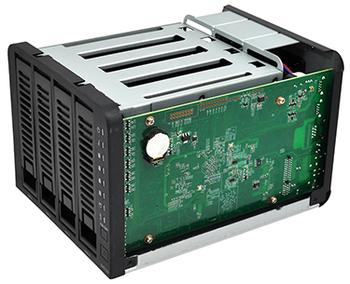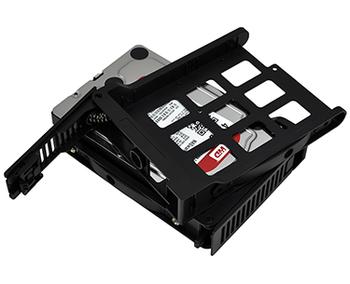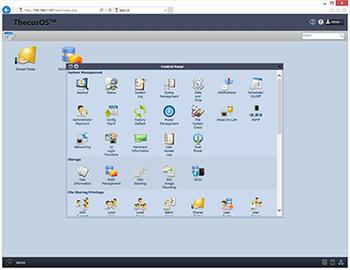Introduction
There are many impressive network-attached storage (NAS) solutions now on the market, and plenty that come equipped with all manner of bells and whistles. Cost, however, continues to act as a barrier to mainstream adoption, and that's an obstacle Thecus is hoping to overcome with the new N4310.
Introduced as a higher-capacity alternative to the existing N2310, this four-bay addition promises "exceptional performance and easy data management at an unprecedented value."
We expect the N4310 to arrive at UK stores carrying a price tag in the region of £260 for a diskless model, and though that can hardly be deemed pocket-change, it is competitive, and undercuts a good chunk of the competition in the four-bay market.
Keeping continuity between models, the N4310 carries the same styling as its dual-bay sibling and is essentially widened to accommodate the doubling of drive trays. Chassis dimensions of 135mm x 170mm x 217mm make this one of the smaller four-bay solutions available, and Thecus chooses a 60W external power supply as opposed to one that's built in.
Build quality at this price point is reasonable, and as expected, the value-orientated unit covers the basics first and foremost. The front of the box is lined with a series of status LEDs, as well as Power and USB Copy buttons, while all the I/O ports are tucked around back. These include two USB 3.0 ports, Gigabit Ethernet, and two power connectors. Only one external supply is provided in the box, but users could add a second for redundancy.
All four drive bays are easily removed via a spring-loaded release mechanism, and the plastic trays support your choice of 2.5in or 3.5in disk. For the purpose of this review, we're loading the N4310 with a quartet of NAS-optimised 4TB WD Red hard drives.
Removing the top cover doesn't reveal a great deal as the bulk of the components are embedded on the PCB. Thecus has implemented a single-core 1.0GHz Applied Micro Catalina 86491 processor and 1GB of DDR3 memory. Neither component is user-upgradeable, but both elements are improved over the smaller N2310 - the processor has been bumped-up in speed by 200MHz and the amount of memory has doubled.
Such components aren't going to set benchmarks alight, however for home or small-office storage, we expect the N4310 to deliver a modest mix of capable performance allied to low power consumption. Handy to know that users can swap out the provided fan, and that wouldn't be a bad modification as the provided model is noisy when in use.
Thecus' setup wizard and web-based admin panel haven't changed a great deal since our look at the N2310 earlier in the year, and neither has our interpretation. The software, dubbed ThecusOS 6, isn't as sleek or user-friendly as some of the competition; it's a utilitarian piece of software that, with a bit of patience, ultimately gets the job done.
Users accustomed to the more advanced UIs available from the likes of Qnap and Synology may lament the inability to multitask with multiple windows, however Thecus does implement a good number of features for a value-orientated box. RAID modes 0, 1, 5, 6 and 10 are all supported, as is migration and expansion, and we appreciate that Thecus has addressed one of our concerns with the N2310 by adding support for idle disk spin-down.
A full list of available features are available on the official product page, along with a live demo of Thecus OS 6, and the highlights include iSCSI support, 128-bit AES encryption, mobile apps for iOS and Android, multiple backup options, as well as an array of built-in servers. These include FTP, Print, iTunes, DLNA Media and Photo, along with dedicated clients for Plex and BitTorrent.
A good array of functions, but can a single-core processor cope with the demands of a four-bay NAS running RAID 5?



